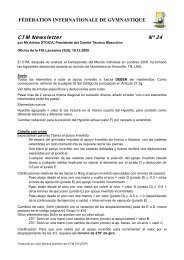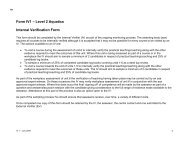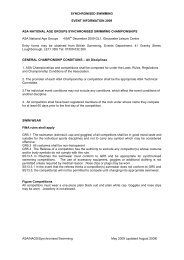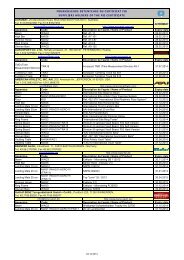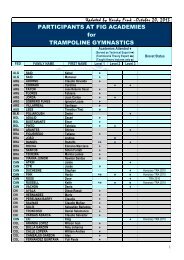10 Steps to Running Your Own Swimming Lesson - sportcentric
10 Steps to Running Your Own Swimming Lesson - sportcentric
10 Steps to Running Your Own Swimming Lesson - sportcentric
You also want an ePaper? Increase the reach of your titles
YUMPU automatically turns print PDFs into web optimized ePapers that Google loves.
<strong>10</strong> STEPS TO RUNNING YOUR OWN SWIMMING LESSON BUSINESS<br />
Dennis Freeman-Wright<br />
MBA, FISRM, MILAM, FIOS<br />
Of the thousands of swimming teachers operating in swimming pools around the British Isles, the majority<br />
work for the government, schools and swimming clubs. Indeed, many teachers work for up <strong>to</strong> five or six<br />
employers, in order <strong>to</strong> create sufficient income from swimming teaching for it <strong>to</strong> be their main income, or at<br />
least a significant contribution <strong>to</strong> the family budget.<br />
Some teachers have taken the bold step and started <strong>to</strong> run their own swimming lessons and operate, one<br />
way or another, as a business. Some teachers just dream about how nice it would be, being one’s own<br />
boss, whilst secretly suspecting it would not be at all pleasant, in fact, quite stressful really. Nevertheless,<br />
the opportunity is always there if the independent minded swimming teacher is prepared <strong>to</strong> ‘have a go’.<br />
The article is by way of a simple guide, which covers most of the essential phases necessary <strong>to</strong> complete<br />
<strong>to</strong> successfully start up a swimming lesson business.<br />
STEP ONE<br />
Before you can start in this business you need a swimming pool. A little obvious I know, but not worth<br />
bothering with anything else unless you have one. They can, of course, be extremely difficult <strong>to</strong> acquire.<br />
For a start they are very expensive <strong>to</strong> build so you probably have <strong>to</strong> hire one from someone else. Most<br />
local authority swimming pools prefer <strong>to</strong> run their own swimming lessons. Why? Well, if they are run<br />
properly they can be extremely profitable. So the most likely candidate for an available swimming pool is an<br />
under-utilised local school pool, a hotel pool, or even a private domestic pool.<br />
The arrangement between the pool owner and you is vitally important. The success of your business<br />
literally depends upon him. He can close you down at a moments notice either through incompetence or<br />
policy. The arrangement is detailed in the contract for Hire. I speak <strong>to</strong> many swimming teachers who hire<br />
facilities who never see or consider a detailed written contract for hire so that when the pool owner decides<br />
<strong>to</strong> cancel the hire agreement there are no safeguards for the swimming lesson business. A whole article<br />
can and will be written on the hire agreement but for the sake of your business continuity it is vital that the<br />
‘termination’ clause gives you sufficient time <strong>to</strong> find an alternative venue.<br />
STEP TWO<br />
Now you know you have a pool, before you do anything else, you must work on your Business Plan. Now a<br />
Business Plan is common sense. It is simply working out how you anticipate your business will develop<br />
over a period of time, say five and ten years. If your projections are reasonable and give a profit then it is<br />
worth doing.<br />
The first area <strong>to</strong> start with is the potential income and the potential costs.<br />
Let us look at three different scenarios.<br />
1. A small shallow private or hotel pool which can accommodate one class of up <strong>to</strong> twelve pupils.<br />
2. A small school pool, say 15 metres long, which can accommodate two classes of twelve pupils, and<br />
3. A 25-metre pool, which can accommodate 3 classes x 12 pupils.<br />
Again, for arguments sake, let’s assume you can hire the pool for two hours every weekday and two hours<br />
at the weekend = 12 hours in <strong>to</strong>tal.<br />
Now the current cost of swimming lessons can vary enormously nationwide. They can vary from as little as<br />
£20/term <strong>to</strong> as much as £120/term, of say 12 weeks. The actual costs need not concern us as they will<br />
inevitably increase through inflation. I will use nominal round figures for ease but I am sure you can apply
eality <strong>to</strong> this concept.<br />
Pool 1.<br />
12 hours = 24 x ½ hour lessons @ a maximum 288 pupils @ £35/pupil/term =<br />
£<strong>10</strong>,080 x 3 terms per year = £30,240 per annum.<br />
Pool 2.<br />
12 hours = 48 x ½ hour lessons @ a maximum of 576 pupils @ £35/pupil/term = £20,160 x 3 terms per<br />
year = £60,480 per annum.<br />
Pool 3.<br />
12 hours = 72 x ½ hour lessons @ a maximum of 864 pupils @ £35/pupil/term = 30,240 x 3 terms per year<br />
= £90,720 per annum.<br />
The three <strong>to</strong>tals for the three different sized pools gives the maximum “turnover” you can achieve, without<br />
introducing crash courses in school holidays, or running four sets of <strong>10</strong>-week courses continuously through<br />
the year.<br />
Before you get excited after doing your own sums – caution must prevail. With the best will in the world you<br />
are not going <strong>to</strong> achieve full classes, or at least not at the start. So as the Chancellor of the Exchequer<br />
says ‘be prudent’. Budget for an average of ten, or if you are a pessimist, eight pupils in each class, this will<br />
bring your anticipated annual income down by 15% or 20 %.<br />
Finally me must consider that most dreaded of Government taxes VAT.<br />
Contrary <strong>to</strong> what most of people think if you run your own swimming lessons you must pay VAT on the<br />
income, and probably on the expenditure of your business. However, this is only if you are above the limit<br />
of registration, which is currently £58,000, but you can see from the examples above that this may easily<br />
exceeded. Therefore the bigger operations must consider deducting 17.5% VAT from income.<br />
This would adjust the income profiles of the example operations thus:<br />
Pool 1 = Income £30,240 Pool 2 = Income £51,472 Pool 3 = £77,208<br />
You can see that the business level of Pool 1 falls below the VAT tax threshold and with Pool 2 income<br />
being just over the VAT threshold it demonstrates just how damaging VAT can be <strong>to</strong> a small business.<br />
Finally, on the subject of income; the arbiter that determines how good the up-take in your classes is going<br />
<strong>to</strong> be is the state of the local market. The questions you must ask yourself and answer confidently are:<br />
• Is there a demand for swimming lessons?<br />
• Do you live in an affluent or deprived area and can the area sustain your costs?<br />
• Is there a lot of competition?<br />
• If so are you the best teacher around?<br />
• Is your pool accessible?<br />
• Is there good car parking?<br />
• Is the pool warm clean and inviting?<br />
• Is the pool opera<strong>to</strong>r reliable?
All these important fac<strong>to</strong>rs and many more need <strong>to</strong> be taken in<strong>to</strong> account when ‘guessing’, yes that’s what<br />
it really is or the first time. ‘Guessing’ your income.<br />
Having calculated potential income the next the next part of the Business Plan is working out your costs,<br />
again these obviously vary depending on the size of the pool and lessons held in them.<br />
Hire of the pool<br />
The hire of the pool can vary enormously. I know some teachers who hire a 25-metre pool for as little as<br />
£<strong>10</strong> per hour (how lucky can you get). Some establishments’ want as much as £<strong>10</strong>0 per hour for a 25-<br />
metre pool. Again for the purposes of this exercise, and so as not <strong>to</strong> date the article, I will select nominal<br />
costs, you insert your own costs.<br />
Pool 1 - £20 per hour - £8,640 per annum<br />
Pool 2 - £40 per hour - £17,280 per annum<br />
Pool 3 - £80 per hour - £34,560 per annum<br />
Cost of other teachers<br />
It is likely that you will wish <strong>to</strong> work some of the swimming teaching hours yourself. Indeed for Pool 1, the<br />
smallest pool where only one lesson takes place at a time you may opt <strong>to</strong> do all of them yourself and keep<br />
your costs down. However where there are two or three classes taking place at the same time you will<br />
need additional teachers <strong>to</strong> support you. Therefore Pool 2 would need 12 hours extra teaching and Pool 3<br />
would need 24 hours extra teaching. It is therefore likely that you may ‘employ’ anywhere between one and<br />
six extra teachers <strong>to</strong> cover all the classes. Without going in<strong>to</strong> employment status, which is dealt with in my<br />
article on ‘Employment Issues in the <strong>Swimming</strong> Teaching Industry’ suffice it <strong>to</strong> say that it is better for you if<br />
these swimming teachers are self-employed. You can work out the hourly rate; lets say for arguments sake<br />
£12 per hour, about the national average in 2004. From this you can work out the cost of staffing the<br />
swimming classes.<br />
Pool 2 – 12 hours @ £12/hour = £144/week x 36 weeks = £5,184<br />
Pool 3 – 24 hours @ £12/hour = £288/week x 36 weeks = £<strong>10</strong>,368<br />
Don’t forget your wage comes out of whatever profit is left after all the costs are deducted from the income.<br />
<strong>Swimming</strong> Aids<br />
Purchase of swimming aids is, of course, essential. You will need between 30 and <strong>10</strong>0 floats, 24 pairs of<br />
armbands, some rings and backpacks. Think about s<strong>to</strong>rage and security. If you leave your equipment<br />
unsupervised in some pools, the lot will disappear in a week. If you are lucky the pool you hire will allow<br />
you <strong>to</strong> use their equipment.<br />
Cost: Pool 1 = £200 Pool 2 = £400 Pool 3 = £600<br />
Insurance<br />
Before you even contemplate stepping on<strong>to</strong> the poolside <strong>to</strong> teach you need <strong>to</strong> make sure you are fully<br />
insured for Civil and Public Liability. The easiest way <strong>to</strong> do this is through the IOS, which provides a swim<br />
School Group cover. You also need <strong>to</strong> be aware of what insurance the poll opera<strong>to</strong>r has in relation <strong>to</strong> his<br />
building and his own civil and public liability and which insurances apply <strong>to</strong> any circumstances that arise out<br />
of your pool hire.<br />
Today’s parents are far more prepared <strong>to</strong> seek litigation if they feel they have not received good service or
their child has been endangered or injured. Part of the art of being a good teacher is communicating with<br />
parents.<br />
Cost: Pool 1 = £40 Pool 2 = £400 Pool 3 = £700<br />
Administration<br />
Administration costs are few, because you are going <strong>to</strong> do most of it yourself. You need a few ledgers <strong>to</strong><br />
keep records and plenty of sheets of paper for class registers, etc.<br />
You will want <strong>to</strong> sell badges and certificates, the parents will demand it. This can cause difficulties at the<br />
end of each lesson, but with ingenuity you can circumvent the problem. Perhaps by only selling the badges<br />
at the end of each term. However, do not forget that most re-booking is carried out whilst classes are taking<br />
place; so unless you have an obliging relative or friend, you may have <strong>to</strong> pay someone <strong>to</strong> do the rebooking,<br />
or cover your classes while you do it. This will generate a cost at the end of each term.<br />
Cost: Pool 1 = £400 Pool 2 = £600 Pool 3 = £800<br />
Accounts<br />
A lot depend on your status as either a self-employed independent trader or as some form of company as<br />
<strong>to</strong> how your accounts are recorded. You will probably have <strong>to</strong> pay for an accountant or book keeper, and<br />
although a company of the size of all our three examples you do not have <strong>to</strong> submit a full set of accounts <strong>to</strong><br />
Companies house, the accounts may still have <strong>to</strong> be approved by an audi<strong>to</strong>r. The costs of these services<br />
can vary wildly and depends on the size and complexity of the business. Shop around locally, it’s just as<br />
important <strong>to</strong> find an accountant you feel you can trust, as well as being inexpensive.<br />
Cost: Pool 1 = £1,000 Pool 2 = £2,000 Pool 3 = £3,000<br />
Marketing<br />
Finally, unless you have fantastic ‘street-cred’, the very first term will require some advertising. The<br />
cheapest and most effective way is a mail shot done by you in the surrounding housing estates, schools,<br />
nursery schools etc. This is very wearing on the shoe leather, but certainly is the most rewarding.<br />
Advertising in local newspapers can be a waste of money. Nowadays people are not avid newspaper<br />
readers and usually the ‘freebie’ newspapers are binned without being read. If you are persuasive you may<br />
get some air time on the local radio station, if you are lucky. Cost is a bit of a guess but you should not<br />
spend more than £1,000.<br />
After the first two or three terms, if you are any good, recommendations will be your best way of securing<br />
bookings. However an occasional mail shot, when the bookings are down, is always good practice.<br />
But wait! How will the cus<strong>to</strong>mers contact you? The best way is <strong>to</strong> have a telephone booking system on an<br />
exclusive mobile phone. I’m afraid you must be prepared <strong>to</strong> take calls all hours of the day, seven days a<br />
week. So from when you are teaching on the poolside you must be prepared <strong>to</strong> take bookings anytime –<br />
anywhere. This can be irritating, but if you want the business <strong>to</strong> work you will have <strong>to</strong> accept the<br />
inconvenience.<br />
Cost: Pool 1 = £500 Pool 2 = £750 Pool 3 = £1,000<br />
Finally you are in a position <strong>to</strong> construct a trial budget for the business.
Income Pool 1 Pool 2 Pool 3<br />
Income (less VAT) £30,240 £51,472 £77,208<br />
Expenditure Pool 1 Pool 2 Pool 3<br />
Pool Hire £8,640 £17,280 £34,560<br />
Teachers £5,184 £<strong>10</strong>,368<br />
Equipment £200 £400 £600<br />
Administration £400 £600 £800<br />
Insurance £40 £400 £70<br />
Accountancy £1,000 £2,000 £3,000<br />
Advertising £500 £750 £1,000<br />
Total £<strong>10</strong>,780 £26,614 £51,028<br />
Gross Profit £19,460 £24,858 £17,938<br />
Of course your salary has not been considered yet.<br />
The Gross Profit from each example can all be taken as your salary, but do not forget your income tax,<br />
national insurance and any personal pension etc. need <strong>to</strong> be considered.<br />
You may also want <strong>to</strong> keep a little in reserve for future advertising and equipment.<br />
STEP THREE<br />
You now have <strong>to</strong> decide whether or not you are going <strong>to</strong> be a ‘sole trader’ or a ‘limited company’. The<br />
advantages are that you do not have <strong>to</strong> complete accounts and returns for Companies house and you do<br />
not have <strong>to</strong> pay Corporation Tax. However, you still have <strong>to</strong> complete your Inland Revenue Annual Return<br />
and complete the extra pages for ‘ self employed person’. So you do have <strong>to</strong> keep accurate accounts. On<br />
the ‘down-side’ you have no ‘limited liability’, which means that if things go disastrously wrong you can lose<br />
everything! Such thoughts are not a good start for a budding entrepreneur and often puts people off<br />
immediately.<br />
Alternatively the advantages and disadvantages of forming a limited company are, naturally, the reverse of<br />
being a ‘sole trader’. If you get your business in a mess and cannot continue at the very worst you lose<br />
your share capital, usually £<strong>10</strong>0. To form a company you have <strong>to</strong> register it at Companies House, make an<br />
annual return, submit auditable accounts and the company is subject <strong>to</strong> Corporation Tax.<br />
Well how do you decide what <strong>to</strong> do? A lot depends on the facility you have available. If you acquire a small<br />
hotel pool, which will only accommodate one class, for a few hours each week, it’s obviously not worth<br />
forming a company. You would be working on your own and the annual turnover of your enterprise would<br />
not be large (Pool1).<br />
Alternatively, if you were lucky enough <strong>to</strong> obtain a school for 2 hours every week day between 4.00pm and<br />
6.00pm, plus some time at the weekends and the pool could accommodate three classes at once, then it<br />
would probably be sensible <strong>to</strong> form a limited company (Pool 3).<br />
The decision does affect your financial forecast.<br />
Income Pool 1 Pool 2 Pool 3<br />
Income (less VAT) £30,240 £51,472 £77,208
Expenditure Pool 1 Pool 2 Pool 3<br />
Pool Hire £8,640 £17,280 £34,560<br />
Teachers £5,184 £<strong>10</strong>,368<br />
Equipment £200 £400 £600<br />
Administration £400 £600 £800<br />
Insurance £40 £400 £70<br />
Accountancy £1,000 £2,000 £3,000<br />
Advertising £500 £750 £1,000<br />
Total £<strong>10</strong>,780 £26,614 £51,028<br />
<strong>Your</strong> Salary £18,000 £24,000 £17,000<br />
Gross Profit £1,460 £858 £938<br />
Corporation Tax - £205 £225<br />
Net Profit/Reserves £1,460 £653 £713<br />
STEP FOUR<br />
To form limited company is not hard. There are many firms, which specialise in setting up companies for<br />
people like you; or you can even buy a handy do-it-yourself pack from a stationer.<br />
The hardest thing you have <strong>to</strong> do is think of a name for your company that has not already been used. The<br />
firm you buy from will supply all the details you need on how <strong>to</strong> keep the Company Register and what<br />
returns <strong>to</strong> make and when.<br />
You will need a Direc<strong>to</strong>r (you) and a Company Secretary (your accountant, one of the other teachers or a<br />
member of your family).<br />
Each year you will have <strong>to</strong> fill in a return <strong>to</strong> Companies House and submit the companies Annual Report<br />
and Accounts. This is primarily the Balance Sheet and Profit and Loss Account for that year. <strong>Your</strong><br />
accountant can do all this for you, if you are not brave enough <strong>to</strong> do most of it yourself. All you have <strong>to</strong> do<br />
is keep all your receipts for your income and expenditure. In addition <strong>to</strong> the registration fee you may need<br />
£<strong>10</strong>0 for the share capital of the company. You can hold all the shares.<br />
Ok - you have decided you are going for it! The next thing you do is <strong>to</strong> ensure you have the colleagues<br />
capable of working with you and how you want.<br />
Regardless of the teachers’ capabilities it is safer for you <strong>to</strong> ensure they are properly qualified. It is good<br />
marketing <strong>to</strong> let the parents know that your teachers are all ASA teachers and hold some lifesaving<br />
qualification relevant <strong>to</strong> the task.<br />
Some of you will have noticed that I did not make allowances for income tax and national insurance<br />
payments for the teachers in examples – Pool 2 and 3; this is because these deductions would be made<br />
from their gross payment, or much more <strong>to</strong> your advantage leave the teachers as self-employed. However<br />
you cannot leave the matter there. You must make sure they have correctly constructed employment<br />
contracts (employed teachers) or contracts for service (self-employed teachers). The IOS have some very<br />
good guidance documents on the construction of both types of contract <strong>to</strong> help you through this part.<br />
It is also important if the swimming teachers are self-employed, <strong>to</strong> ensure that they are IOS members, so<br />
that they are individually insured with civil and public liability insurance.
STEP SIX<br />
Now that you are the new direc<strong>to</strong>r of your company, or you have decided <strong>to</strong> be a ‘one man band’ you can<br />
now go and hire the swimming pool. Give yourself plenty of time before the start date of the lessons <strong>to</strong> sort<br />
out problems you have not foreseen and <strong>to</strong> implement your advertising strategy.<br />
When hiring the pool make sure you have a written contract. Some important issues need addressing in<br />
the contract agreement i.e.<br />
• Times and dates of hire, make sure you acquire as long a hire period as you can get <strong>to</strong> give<br />
yourself security of continuity. Unfortunately most pool opera<strong>to</strong>rs will not commit themselves <strong>to</strong><br />
more than a 6-month hire period.<br />
• A termination or cancellation clause should be included, again try and achieve as long a notice<br />
period as is reasonably possible. One month is usual but one term would be more beneficial <strong>to</strong> you<br />
and give you time <strong>to</strong> acquire alternative premises.<br />
• Check where you stand with regards <strong>to</strong> unforeseen or unexpected closures and refunds and<br />
damages. Normally the best you can get is a refund on lost hire but you need <strong>to</strong> be aware that this<br />
may require you <strong>to</strong> refund your cus<strong>to</strong>mers so do not spend your advanced income <strong>to</strong> early in the<br />
term.<br />
• Periods when the hire agreement can be renegotiated. If you have an open-ended hire agreement<br />
the pool owner may wish <strong>to</strong> review the hire charges time <strong>to</strong> time.<br />
• What area of the swimming pool have you hired? The whole facility, the pool and changing rooms<br />
and viewing gallery, or the pool only. This does matter if you have problems with over lapping<br />
cus<strong>to</strong>mer use. You do not want the next cus<strong>to</strong>mer infringing on your hire time and space.<br />
• What are your responsibilities, particularly with regards <strong>to</strong> health and safety? You need <strong>to</strong> know in<br />
writing who is responsible for cleaning and maintaining the facility whilst you are using it. You need<br />
<strong>to</strong> know what you are responsible for? For example if vandalism takes place during your hire period<br />
who is responsible for the repair?<br />
• What competencies and qualifications does the hire agreement require you <strong>to</strong> have <strong>to</strong> hire the pool<br />
and what lifeguard commitment are you required <strong>to</strong> provide, if any?<br />
If you are unsure of anything it may pay you in the long run <strong>to</strong> get the contract checked by a solici<strong>to</strong>r.<br />
STEP SEVEN<br />
Advertise the lessons and feel the stress rise. This is the risky bit. It is easy <strong>to</strong> be alarmed if the bookings<br />
do not come in as fast as you expected. However, if you have studied the area properly and are sure there<br />
is a market for your services, you should achieve sufficient bookings not <strong>to</strong> make a loss in the first term;<br />
and if the whole thing goes completely wrong then you can cancel with minimum loss.<br />
STEP EIGHT<br />
You cannot ignore your health and safety obligations <strong>to</strong> your cus<strong>to</strong>mers and staff if you have any. You have<br />
a common law duty of care <strong>to</strong> your cus<strong>to</strong>mers and anyone affected by your business. You are required<br />
therefore <strong>to</strong> risk assess your activities, identify hazards and minimize their risk where it is reasonably<br />
practicable <strong>to</strong> do so.<br />
By risk assessing it should au<strong>to</strong>matically lead you <strong>to</strong> creating some simple operating procedures for your<br />
activities. It is wise <strong>to</strong> write these down and make them available <strong>to</strong> anyone who needs them. Obviously if<br />
you are hiring someone else’s facility they should already have a <strong>Swimming</strong> Pool Operating Procedure<br />
(SPOP), which includes an Emergency Action Plan. Many of the hazards that you need <strong>to</strong> consider may<br />
already be included in the main SPOP so you need <strong>to</strong> check before you create your own. <strong>Your</strong> SPOP will<br />
be something like an addendum <strong>to</strong> the main one. Importantly you should know your role within the<br />
Emergency Action Plan.
Unfortunately, swimming teachers often work in a strange variety of locations and it is not unusual for a<br />
school or hotel <strong>to</strong> be <strong>to</strong>tally clueless when it comes <strong>to</strong> essential swimming pool health and safety<br />
procedures. For your own protection you must ensure that a risk assessment is carried out and that a<br />
swimming Pool Operating Procedure is created. If the pool opera<strong>to</strong>r does not want <strong>to</strong> know, do as much as<br />
you can yourself, keep it for you, your colleagues and your cus<strong>to</strong>mers <strong>to</strong> operate by.<br />
STEP NINE<br />
Amazingly, one of the greatest advantages of running swimming lessons as a business is that the<br />
cus<strong>to</strong>mers pay in advance and the bills are generally paid in arrears. This means that your bank account is<br />
usually in credit and you may not have <strong>to</strong> talk <strong>to</strong> a bank manager about overdraft facilities or loans at all.<br />
There is a further benefit <strong>to</strong> this because without having <strong>to</strong> go ‘cap in hand’ <strong>to</strong> the bank you wont have <strong>to</strong> do<br />
a complete business plan. However for your own benefit and safety you must create a company budget<br />
from STEP TWO and then up-date it in the light of the real bookings received in your first term.<br />
Congratulations, you are now running your own business.<br />
This article is not about how you teach; as qualified teachers you should already know all about that.<br />
However when running your own business you must start thinking in terms of cus<strong>to</strong>mers and pupils. You<br />
will find at times you have unpleasant cus<strong>to</strong>mers – the parents. <strong>Swimming</strong> teachers who are employees<br />
and do not carry out the registration role that a receptionist often undertakes are often ‘cushioned’ from the<br />
many difficulties the parent/cus<strong>to</strong>mer poses. Some parents do not like <strong>to</strong> pay in advance and they know it<br />
is hard <strong>to</strong> turn children away, once on poolside. However <strong>to</strong> maintain a health cash flow you have <strong>to</strong> be<br />
positive about payment. All parents make demands for their children and you must acquire the<br />
communication and personnel skills <strong>to</strong> manage them.<br />
Fortunately most of the bills are paid in arrears and therefore difficult payers will not cripple your business.<br />
You pay your teachers and yourself in arrears at the end of each month and most council’s and schools are<br />
rarely efficient enough <strong>to</strong> invoice you until well in<strong>to</strong> the term. However never get <strong>to</strong>o complacent and never<br />
spend future lesson income before you have delivered the service. Remember it is not your swimming pool<br />
and you can never be one hundred percent sure of your advanced bookings.<br />
Throughout the year you will also have <strong>to</strong> manage your own salary. This means keeping PAYE and NI<br />
records, deducting payments from your salary and sending them <strong>to</strong> the tax office. The Inland Revenue<br />
provides all the documentation for this, all you have <strong>to</strong> do is create of buy your own pay slips. All the tables<br />
and guidance can be quite off putting at first, but once you work it out it really isn’t hard. Nevertheless you<br />
could get an accountant <strong>to</strong> do this part if you are not happy taking it on. Remember if you are selfemployed<br />
you do not have <strong>to</strong> pay your tax until the following years tax demand, so save the money and<br />
bank it separately.<br />
Similarly if your VAT exceeds the tax threshold you will have <strong>to</strong> complete a VAT return. You will see from<br />
the previous examples that the VAT payments can make a big difference <strong>to</strong> a small business and that Pool<br />
1 is actually more efficient than the larger pools because there is no VAT consideration. Operating below<br />
the VAT threshold should always be a consideration for a sole trader. Nevertheless, do not be alarmed by<br />
the VAT returns, they are remarkably easy <strong>to</strong> do, as long as you keep a record of your invoices and<br />
receipts.<br />
Finally at the end of each year a company has <strong>to</strong> send an annual Income Tax and National Insurance<br />
Return for all employee, again all the forms are provided and as long as you do simple arithmetic you will<br />
be alright.<br />
STEP TEN<br />
AT the end of your first year all your receipts, invoices, pay slips, etc. go <strong>to</strong> your accountant. He will
produce your companies Annual Report. You will find out how much you have <strong>to</strong> pay in Corporation Tax,<br />
but you will not have <strong>to</strong> pay it for a further six months or so. Keep it in the bank earning interest – do not<br />
spend it.<br />
Well you have done it. Three terms, one year, running your own business. If you have made more than<br />
50% uptake in each class you will probably have made a profit.<br />
Where <strong>to</strong> now? First of all check your spouse hasn’t left you without you knowing. Then construct your<br />
second year budget much more accurately based on what you have learnt in the first year, decide if it is<br />
worth continuing and – start all over again.<br />
Perhaps this course of action is not for the faint hearted, but the rewards are there. If you are not a<br />
pessimist, like me, work out the figures optimistically and frighten yourself.<br />
Go for it, will achieve greater job satisfaction and probably greater financial reward, also some tears and<br />
laughter along the way.<br />
Good Luck.<br />
NOTE: All figures are just a general guide and do not represent specific rates of pay, hire, tax or other<br />
costs.<br />
Guidance can be obtained by members from the author on an ASA/IOS advisory telephone line at 0870<br />
2403378.








